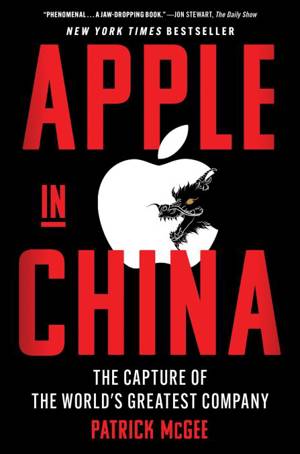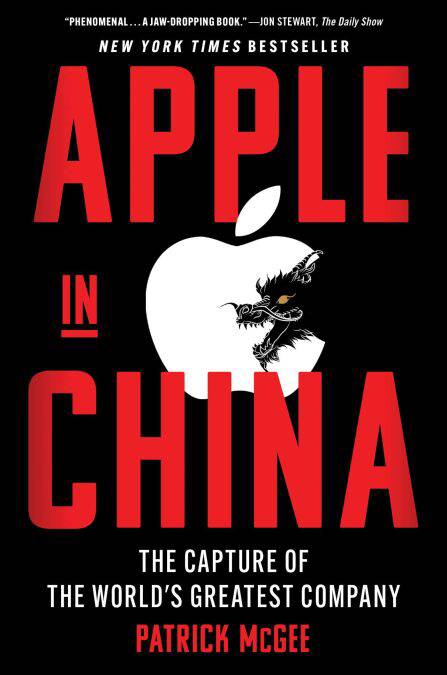
- Retrait gratuit dans votre magasin Club
- 7.000.000 titres dans notre catalogue
- Payer en toute sécurité
- Toujours un magasin près de chez vous
- Retrait gratuit dans votre magasin Club
- 7.000.0000 titres dans notre catalogue
- Payer en toute sécurité
- Toujours un magasin près de chez vous
19,00 €
+ 19 points
Format
Description
“Phenomenal…a jaw-dropping book.” —Jon Stewart, The Daily Show
Named by both The New York Times and The Economist as one of the best books of the year so far, this “scrupulously reported” (The New Yorker) and “astonishing” (The Daily Telegraph, London) book rivets with its portrayal of how Apple allowed itself to become dependent on China for a huge percentage of its manufacturing, making it vulnerable and unwittingly laying the groundwork for the Asian superpower to rival the US in technological expertise.
After struggling to build its products on three continents, Apple was lured by China’s seemingly inexhaustible supply of cheap labor. Soon it was sending thousands of engineers across the Pacific, training millions of workers, and spending hundreds of billions of dollars to create the world’s most sophisticated supply chain. These capabilities enabled Apple to build the 21st century’s most iconic products—in staggering volume and for enormous profit.
Without explicitly intending to, Apple built an advanced electronics industry within China, only to discover that its massive investments in technology upgrades had inadvertently given Beijing a power that could be weaponized.
In Apple in China, journalist Patrick McGee draws on more than two hundred interviews with former executives and engineers, supplementing their stories with unreported meetings held by Steve Jobs, emails between top executives, and internal memos regarding threats from Chinese competition. The book highlights the unknown characters who were instrumental in Apple’s ascent and who tried to forge a different path, including the Mormon missionary who established the Apple Store in China; the “Gang of Eight” executives tasked with placating Beijing; and an idealistic veteran whose hopes of improving the lives of factory workers were crushed by both Cupertino’s operational demands and Xi Jinping’s war on civil society.
Apple in China is the sometimes disturbing and always revelatory story of how an outspoken, proud company that once praised “rebels” and “troublemakers”—the company that encouraged us all to “Think Different”—devolved into passively cooperating with a belligerent regime that increasingly controls its fate.
Named by both The New York Times and The Economist as one of the best books of the year so far, this “scrupulously reported” (The New Yorker) and “astonishing” (The Daily Telegraph, London) book rivets with its portrayal of how Apple allowed itself to become dependent on China for a huge percentage of its manufacturing, making it vulnerable and unwittingly laying the groundwork for the Asian superpower to rival the US in technological expertise.
After struggling to build its products on three continents, Apple was lured by China’s seemingly inexhaustible supply of cheap labor. Soon it was sending thousands of engineers across the Pacific, training millions of workers, and spending hundreds of billions of dollars to create the world’s most sophisticated supply chain. These capabilities enabled Apple to build the 21st century’s most iconic products—in staggering volume and for enormous profit.
Without explicitly intending to, Apple built an advanced electronics industry within China, only to discover that its massive investments in technology upgrades had inadvertently given Beijing a power that could be weaponized.
In Apple in China, journalist Patrick McGee draws on more than two hundred interviews with former executives and engineers, supplementing their stories with unreported meetings held by Steve Jobs, emails between top executives, and internal memos regarding threats from Chinese competition. The book highlights the unknown characters who were instrumental in Apple’s ascent and who tried to forge a different path, including the Mormon missionary who established the Apple Store in China; the “Gang of Eight” executives tasked with placating Beijing; and an idealistic veteran whose hopes of improving the lives of factory workers were crushed by both Cupertino’s operational demands and Xi Jinping’s war on civil society.
Apple in China is the sometimes disturbing and always revelatory story of how an outspoken, proud company that once praised “rebels” and “troublemakers”—the company that encouraged us all to “Think Different”—devolved into passively cooperating with a belligerent regime that increasingly controls its fate.
Spécifications
Parties prenantes
- Auteur(s) :
- Editeur:
Contenu
- Nombre de pages :
- 448
- Langue:
- Anglais
Caractéristiques
- EAN:
- 9781668053393
- Date de parution :
- 12-05-25
- Format:
- Ebook
- Protection digitale:
- Adobe DRM
- Format numérique:
- ePub

Les avis
Nous publions uniquement les avis qui respectent les conditions requises. Consultez nos conditions pour les avis.






